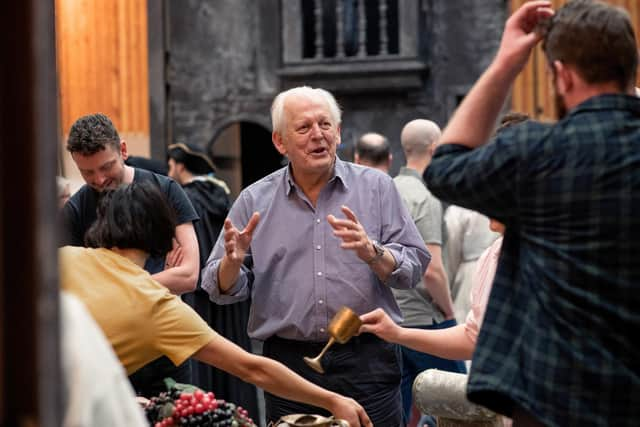Sir Thomas Allen on Scottish Opera’s The Barber of Seville: ‘It has to grow with each performance’
Even in his 80th year there’s no stopping Sir Thomas Allen. The affable County Durham-born baritone, famous from Covent Garden to the New York Met for a lifetime of agile and charismatic operatic characterisations, may have dialled down on the number of on-stage roles he accepts, but as Scottish Opera fans are blissfully aware, he has turned his creative attention in recent years to directing opera, notably Mozart and Rossini.
He’s back in Scotland right now, preparing for the latest revival of his 2007 production of The Barber of Seville, an all-action version of Rossini’s perennial favourite described by The Scotsman during its 2011 re-staging as “a fitting aesthetic home for opera buffa in the 21st-century”.
Advertisement
Hide AdAdvertisement
Hide AdThis time round it’s to be sung in English, a policy Allen hasn’t always favoured, but to which he has warmed, courtesy of a translation by the ever-reliable Amanda Holden. “Matching the musical inflexions of the original Italian is always a problem, but it’s all part and parcel of the process,” he says. “And it does allow you to work on it as though it’s a Shakespeare play, a social comedy, and have far greater freedom with it.”


Not all of those in this new Scottish Opera cast have English as their first language. Alongside such seasoned performers as Samuel Dale Johnson (Figaro), Simone McIntosh (Rosina), Anthony Gregory (Almaviva) and David Stout (Bartolo), is the young Ukrainian soprano Inna Husieva – one of the company’s latest intake of Emerging Artists – singing Berta. “To see this young lady diligently working at the comedy and recitative in a language that isn’t her own has been uplifting,” says Allen, “and there’s a healthy curiosity within the entire cast that is making the exploration of new ideas so much fun.”
He equates fun with commitment. “I was once in a car in America with a soprano – we’d just done the second performance in a new Met production. She said to me: ‘Tom, I’ve got a question. How do you deal with the boredom in a long run like this?’ I couldn’t think of an answer, except maybe to say ‘kindly leave the car and find something else to do’.” Ever the gentleman, he bit his tongue.
The idea that the development of a production ends the moment it hits opening night is not for him. “It has to grow. Different directors have different ways of imparting that. I would say to this cast, as we progress from Inverness to Aberdeen, Glasgow to Edinburgh, you need to trust your instincts. Take a chance. That way you’ll discover things you hadn’t expected and it won’t become stale.”
Allen lives by his own words. Turning to directing was never a planned move. “It just happened from outside, as with most of my career. But I’ve found it to be wonderfully creative, whereas being a singer is a much more recreative process, where you’re at the behest of a composer, conductor and director.” That said, he’ll be starring on-stage next summer, singing the Baron to Danielle de Niese’s Hanna Glawari in Glyndebourne’s first-ever production of The Merry Widow.
He’s fundamentally a theatre man, he insists. “The fun of being on stage is in the physicality. I’ve never lost that hunger.” One of his most rewarding projects in recent years was to play Gloucester in a highly-praised Grange Festival production of Shakespeare’s King Lear, in which all the roles were played by opera singers, and Gloucester’s eyes were gouged out by Regan’s stiletto heel. “Who says singers can’t act?”, says Allen, whose next big project, in November, is to play the title role in a theatrically-expanded rewrite by Christopher Gillett of Mozart’s Schauspieldirektor for OPERA ZUID in the Netherlands.
By then he should be free of the conspicuous sling currently supporting his arm. “I fell backwards over a watering can in the garden,” he confesses. Yet another good reason why retirement should remain on the back burner.
Advertisement
Hide AdAdvertisement
Hide AdScottish Opera’s The Barber of Seville is at the Theatre Royal, Glasgow, 17-28 October; Festival Theatre, Edinburgh, 3-11 November; Eden Court, Inverness, 16 & 18 November; and His Majesty’s Theatre, Aberdeen, 23 & 25 November, see www.scottishopera.org.uk